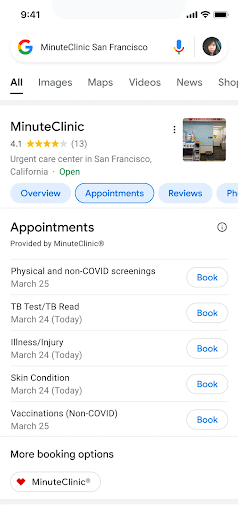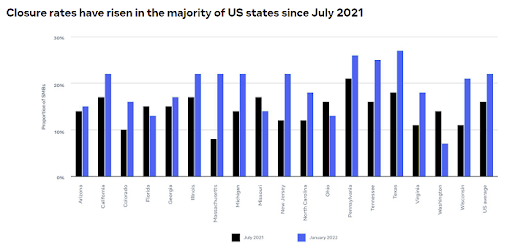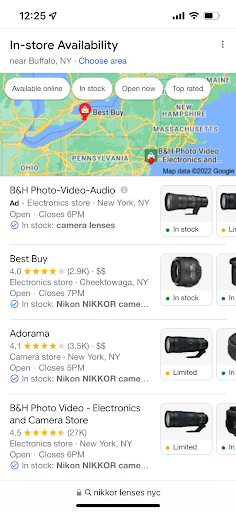In this week’s update, learn about Google’s efforts to combat fraudulent user content; new appointment booking options for healthcare providers; EU regulations targeting big tech; tips from Yelp on using reviews to improve your business; Meta’s report on the state of small businesses globally; and product photos in local search results.
Google Says It Blocked 100M User Edits in 2021
Google has issued a new report on its efforts in 2021 to battle fake and fraudulent content in Google Maps, claiming that due to these efforts, less than 1% of the content published in Google Maps is either fraudulent or abusive. Google claims that it receives 20 million new inputs every day from users who contribute content to Maps, making constant vigilance necessary. Amongst several statistics in the report are the following:
- 7 million fake business profiles removed
- 12 million fake profiles blocked
- 1 million user accounts disabled for belonging to “bad actors”
- 100 million abusive edits blocked
- 8 million unauthorized profile claims prevented
- 100,000 profiles protected from abuse or suspicious activity
- 95 million reviews blocked or removed for policy violations
- 190 million photos and 5 million videos blocked or removed for quality or content issues
Despite some recent claims that Google content contributions are declining, the company says user contributions were 30% higher in 2021 than in 2020, which would mark a significant increase perhaps linked to reopening after the first phase of the pandemic. As with previous reports on content moderation, Google offered details in the report about automated methods making use of machine learning, supported by a team of human moderators.
Google Will Add Next Available Appointment for Healthcare Providers
Google will begin displaying the next available appointment at select healthcare facilities, according to a statement from the company. Starting in the next few weeks, appointment availability will begin to appear for MinuteClinic facilities at CVS as well as other partners. At first, the program will be in English only.
A new Appointments tab will appear in the Google Business Profile of participating facilities, detailing the types of appointments available as well as the next available date for each. Patients will be able to click a “Book” button to make an appointment, reportedly via third-party booking service. It’s unclear as yet how these buttons are configured in profiles and how soon other providers will be able to participate.
Courtesy Google
New EU Regulations Target Big Tech Companies
Landmark antitrust regulations passed by the European Union last week could have a major impact on U.S. big tech companies including Apple, Google, Amazon, and Meta. Similar to recently proposed legislation in the U.S., the new Digital Markets Act (DMA) is designed to regulate so-called “gatekeepers,” meaning companies with very high market capitalizations, a large number of users, and control over major services like search engines, marketplaces, social networks, and web browsers.
Targeting anticompetitive practices, the regulations state that such companies cannot rank their own services over similar services provided by others. The act also regulates the collection of private data and provides special protections for business users of targeted platforms, as well as restricting pre-installation of software and banning requirements for app developers to use the platform’s default payment method. As with the proposed U.S. legislation, the new regulations may threaten the ability of companies like Google to showcase their own offerings, such as Google’s local search results, more prominently than those of other publishers. The regulation may also force Apple to allow users to install apps using services other than the App Store.
Enforcement of the Digital Markets Act is expected to begin as early as October.
Yelp Offers Tips on Using Reviews to Improve Your Business
A new post on the Yelp blog offers tips for making use of reviews in order to analyze customer sentiment and improve your business. Yelp recommends that businesses read their reviews carefully in order to learn from them, offering three key recommendations.
First, businesses should read reviews to discover common themes in the positive comments they receive. Whatever it is that customers love about your business can be reinforced as your key differentiator, and often, reviews reveal details you’ve neglected in your own marketing. Second, businesses should look to reviews as signals for what they need to improve. A tire shop, for example, learned from their reviews that they needed to set clearer expectations for how long service would take. Finally, businesses can use review response to show off their customer service acumen. Yelp points out that consumers read negative reviews in part to see how the business will respond. Responding to reviews is an opportunity to show the reviewer and other customers that you take feedback seriously.
In an earlier post, Yelp offered a systematic method for analyzing your reviews in order to spot recurring themes that can inform operational improvements.
Meta Reports on the State of Small Businesses
Facebook parent company Meta has issued a report on the state of small businesses globally, collecting responses from 24,000 business leaders in 30 countries. The report finds that many businesses are still struggling under the impact of the pandemic. In fact, the number of businesses forced to suspend operations due to COVID was up slightly in January at 20% of those surveyed, compared to 18% in July 2021. This includes increased closures in most U.S. states. Of those businesses that were open in January, 30% reported higher revenues than in the same period a year before – meaning the majority had revenues that were the same or lower. Female and minority-led businesses were impacted more severely than others.
The report also analyzed digital usage among business owners, finding that 81% had used digital tools of some kind in the past 30 days, with communication tools finding the greatest popularity at 50% of businesses. In North America, 38% of businesses say they’ve sold most of their products or services online.
Courtesy Meta
Product Photos in Local Search Results
In another development in the rise of visual search, Google is increasingly displaying shoppable product photos in local results, according to a new report from Mike Blumenthal. These product images come from the Merchant Center, where businesses can upload product inventory for specific store locations. Results appear on mobile devices for certain kinds of product searches only. Product photos generally direct the user to Google Shopping, where one must click through to the merchant site to complete a purchase – an unnecessary number of clicks according to Blumenthal. When displayed, these images take the place of any product photos that may be present in Google Business Profile for the business.
Courtesy Mike Blumenthal
Damian Rollison
Subscribe to Local Memo!
Signup to receive Local memo updates and the latest on localized marketing, delivered weekly to your inbox.


